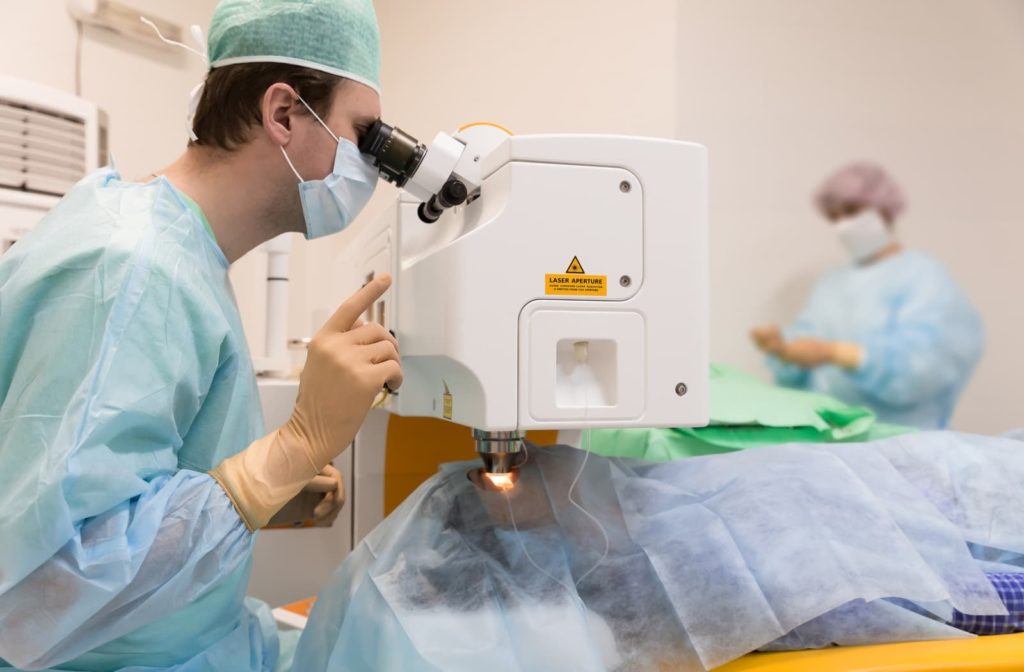
Laser eye surgery has come a long way since it was first introduced, making it accessible to more people than ever before. But even with all these advancements, not everyone is a candidate for laser eye surgery.
Conditions like diabetes, glaucoma, and cataracts can influence whether laser eye surgery is right for you. Even personal preferences and lifestyle can interfere. To get the best advice on laser eye surgery, you should visit your optometrist for a laser eye surgery consultation.
Reasons You Can’t Get Laser Eye Surgery
Your Eyes Aren’t Healthy
- Eye infection: Any eye infection, including pink eye and herpes, mean you can’t get laser eye surgery until your eyes heal completely.
- Eye injury: Including healing eye injuries or permanent damage.
- Dry eye: Laser eye surgery can make persistent or severe dry eye worse as dry eye is a common side effect.
- Cataracts: Cataracts mean you can’t get LASIK or PRK, but you may be eligible for a lens replacement surgery.
- Glaucoma: Laser eye surgery can increase your eye pressure and worsen glaucoma.
Your Eyes Have Some Kind of Irregularity
- Thin cornea: Laser eye surgery involves removing some of the cornea, which can’t be done if your corneas are too thin.
- Large pupils: Large pupils put you at a greater risk of complications like glare and halos.
- Keratoconus or extremely irregular cornea: Keratoconus is progressive and causes thinning of the cornea, both factors that mean you can’t get laser surgery.
- Eyelid issues: Lid disorders, like those that prevent your eyelid from closing completely, can make complications like dry eye worse.
Your Prescription
- Very high prescription: Laser surgery for very high prescriptions has a greater risk.
- Fluctuating prescription: Your prescription must be stable for at least a year before surgery.
- Under 18: Most people’s vision doesn’t stabilize until their late teens or early twenties, so you must be at least 18.
- Presbyopia: Presbyopia is a very common condition that prevents your eye from focusing on close-up objects (it’s why many people in their 40s or older need reading glasses). Traditional laser surgery can’t correct presbyopia, and if you have laser surgery to correct nearsightedness in your younger years, it can actually make your presbyopia worse when you’re older.
You Have Other Conditions that Affect Your Eye Health
- Pregnant or nursing: Pregnancy can cause vision changes, and the medication you might need after laser eye surgery isn’t safe for pregnant or nursing women.
- Diabetes: Your blood sugar levels must be well controlled, and you can’t have diabetic eye disease like diabetic retinopathy.
- Autoimmune disease/taking immunosuppressants: Issues with your immune system can increase your risk of infection.
- Chronic pain conditions: Some people with conditions like fibromyalgia and migraines have more severe postoperative pain.
Other Reasons
- Cost: Because laser eye surgery is an elective surgery, it is not covered by most health insurance plans. However, it is sometimes partially covered under a healthcare spending account and is tax-deductible.
- Fairly good vision: If you only need to wear glasses or contacts part-time, you may decide that laser surgery isn’t worth the risk.
- Unable to follow aftercare instructions: Some people will need to take up to 1 week off work after surgery. You’ll also need to go to a postoperative exam and follow other aftercare instructions.
- Contact sports: You’ll need to avoid contact sports until your eyes are completely healed, usually at least 1 month.
- Not comfortable with the risks: Side effects from laser surgery can include poor night vision, glare, halos, and double vision. In extreme cases, laser eye surgery can cause astigmatism and worsen your vision.
- Unreasonable expectations: Laser eye surgery does not give everyone perfect vision. In fact, you may still need to wear glasses after the procedure. Make sure you understand the possible side effects and discuss any concerns with your optometrist.
Types of Laser Eye Surgery (& Who They’re Best for)

LASIK
Laser-assisted in-situ keratomileusis, or LASIK, is the most common type of laser eye surgery. It’s likely what will be recommended to you, unless you have an issue that prevents you from getting LASIK.
LASIK is used to correct:
- Nearsightedness/myopia
- Farsightedness/hyperopia
- Astigmatism/irregular cornea
For presbyopia, you can get a version of LASIK called monovision, where one eye is corrected for near vision, and the other is corrected for distance vision.
LASIK surgery works by first creating a corneal flap. The flap is peeled back to reveal the cornea stroma. Then, a laser is used to reshape the cornea and correct your vision.
PRK
Photorephractive keratectomy (PRK) was the first type of laser eye surgery, and today it’s the second most common type. PRK can correct:
- Nearsightedness/myopia
- Farsightedness/hyperopia
- Astigmatism/irregular cornea
- Presbyopia (through monovision)
The main difference between LASIK and PRK is that in PRK, no corneal flap is created. Instead, the outer layer of the cornea is removed. Then, your vision is corrected with a laser in the same way as LASIK.
Because there is no corneal flap, PRK is often a better choice for people with thin corneas or very active jobs/lifestyles.
Lens Replacement
There are various types and names for lens replacement surgeries, including:
- Implantable contact lens (ICL)
- Refractive lens exchange (RLE)
- Intraocular lens (IOL) implant/cataract surgery
Lens replacement surgeries aren’t technically laser eye surgery because a laser isn’t used to correct your vision. However, lens replacement surgery could correct your vision if traditional laser surgeries aren’t an option.
Lens replacement can correct:
- Severe nearsightedness/myopia
- Severe farsightedness/hyperopia
- Severe astigmatism
- Presbyopia (with a multifocal lens implant)
- Cataracts (with a clear lens implant)
Find Out for Sure if Laser Eye Surgery is Right for You
The best way to know what’s right for you is a laser eye surgery consultation. During a laser eye surgery consultation, your optometrist will be able to evaluate your eye health and your options.
An optometrist can discuss any of your concerns, and detect things you can’t on your own, like large pupils or thin corneas. Your optometrist can also discuss the risks and benefits, so you can make the best decision for you.


